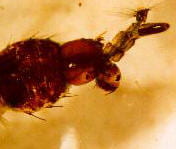
Predation causes selection on behavior – Marc Gravel (MS student) and I tested two relevant hypotheses: 1) Behavior of Aedes triseriatus is related to risk of predation over the short term (i.e., hours), but has little impact on risk over one or more generations; 2) Behavioral variation in A. triseriatus is largely non-genetic, hence behavioral differentiation among populations cannot evolve. In a laboratory culling experiment, we showed that predation can select for altered behavior in as few as two generations, refuting both hypotheses.
Behavior, risk of predation, and competitive ability – Chris Grill (an undergraduate) and I showed that behavior determines risk of predation over multiple time scales by showing that differences in behavior between A. triseriatus and Aedes aegypti accurately predict vulnerabilities to predation by T. rutilus over both short and long time scales. We also showed that interspecific differences in behavior were poor predictors of competitive ability, suggesting only limited trade-offs between risk of predation and competitive ability.
More recent research in my lab by Banu Kesevaraju (Ph.D. Student) shows that although A. triseriatus reduce foraging activity in water that previously contained a feeding T. rutilus, the introduced species Aedes albopictus does not show this behavioral response to the threat of predation. Jillian Wormington (MS student) showed that predator-induced changes in behavior in Aedes triseriatus are both hunger-dependent and sex-specific, with males responding more strongly than females.
We have also investigated the role of the small predatory midge, Corethrella appendiculata as a factor influencing invasion success and impact of Aedes albopictus. Other recent and current work involves the effects of cues from predation on oviposition choices made by adult female Aedes.
For more details on this research topic, please see:
Chandrasegaran, K, SA Juliano. 2019. How Do Trait-Mediated Non-Lethal Effects of Predation Affect Population-Level Performance of Mosquitoes? Frontiers in Ecology & Evolution, 7:25. https://www.frontiersin.org/articles/10.3389/fevo.2019.00025/full
Juliano, S.A, K.M. Westby, G.D. Ower. 2019. Know your enemy: Effects of a predator on native and invasive container mosquitoes. Journal of Medical Entomology. 56: 320–328 https://doi: 10.1093/jme/tjy196
Ower, GD, SA Juliano. 2019.The demographic and life history costs of fear: Trait-mediated effects of threat of predation on Aedes triseriatus. Ecology and Evolution 9:3794-3806 https://onlinelibrary.wiley.com/doi/epdf/10.1002/ece3.5003
Andrade, MR, JA Breaux, D Albeny Simões, SA Juliano, E Lima. 2017. Are behavioural responses to predation cues linked across life cycle stages? Ecological Entomology. 42:77-85 DOI: 10.1111/een.12358 https://www.researchgate.net/profile/Daniel_Albeny/publication/310473920_Are_behavioural_responses_to_predation_cues_linked_across_life_cycle_stages_Associated_behavioural_responses_to_predation/links/5834004408ae102f07369954.pdf
Wormington, JD, SA Juliano. 2014. Hunger-dependent and sex-specific antipredator behaviour of larvae of a size-dimorphic mosquito. Ecological Entomology 39:548–555 http://onlinelibrary.wiley.com/doi/10.1111/een.12129/abstract
Juliano, SA, Lounibos, LP, Nishimura, N, Greene, K. 2010. Your worst enemy could be your best friend: Predator contributions to invasion resistance and persistence of natives. Oecologia. 162:709-718.
Kesavaraju, B., & Juliano, S. A. 2004. Differential behavioral responses to water-borne cues to predation in two container dwelling mosquitoes. Annals of the Entomological Society of America 97:194-201
Juliano, S. A. & M. E. Gravel. 2002. Predation and the evolution of prey behavior: An experiment with tree hole mosquitoes. Behavioral Ecology 13:301-311
Grill, C. P. & Juliano, S. A. 1996 Predicting species interactions based on behaviour: predation and competition in container-dwelling mosquitoes. Journal of Animal Ecology 65:63-76.
Juliano, S. A. 1996. Geographic variation in Aedes triseriatus (Diptera: Culicidae): temperature dependent effects of a predator on survival of larvae. Environmental Entomology 25:624-631.